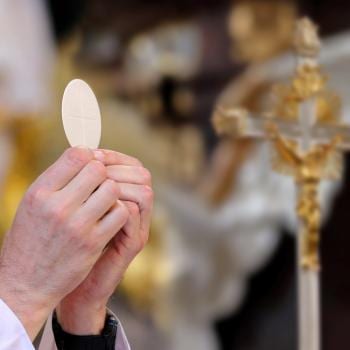It’s wedding season and the following question popped up on a Facebook thread I participated in. There were a lot of solid responses offered, but the questioner mentioned that he felt my response made the most sense to him, so I thought I would share the interaction.
QUESTION: My girlfriend is a Protestant and her mother recently asked her a question that I haven’t been able to find much information on. She asked, “Why can’t a Protestant and a Catholic have a Protestant marriage recognized by the Catholic Church?” My understanding is with the proper dispensation, it is possible. I couldn’t really explain though why a dispensation is required or what that entails. Can you enlighten me on how to explain what the rule is and why it is that way?
ANSWER: Of course, the most obvious way to answer this is in terms of the canonical “rules” or sacramental “requirements” but I think these sorts of answers, while being technically correct, miss the point. What does it really mean to say to a person that “dispensation from form” is required for a Catholic to get married in a non-Catholic church. That just ends up sounding like “Catholics have a bunch of rules that have to be followed by everyone regardless of whether they’re Catholic because we say so dammit…so there!” and doesn’t really move the conversation forward in any personally meaningful way.
I would like to suggest a more pastoral/practical answer.
The entire Christian walk, from baptism forward, is intended to be a process of discipleship in which we learn to answer the question, “How does God wish us to love him and each other?” Catholic marriage, which is all about living out this baptismal call–makes some specific claims about what it means to be loving: namely, that it requires a couple to be willing to commit their lives to apprenticing in the Catholic vision of love.
For all intents and purposes–because we are all broken and fallen people who really don’t know how to love each other–from a Catholic perspective, whatever THE COUPLE thinks marriage ought to be is irrelevant. Instead, when a couple agrees to get married in the Church, they are agreeing to let the Church define their marriage for them as an intimate partnership dedicated to an ever deepening experience of love as a free, total, faithful, and fruitful, mutual self-gift. The couple that marries in the Church is, in effect, saying, “We recognize that we don’t naturally know how to love each other as God wants us to, but we promise to spend our life learning how to love each other in the free, total, faithful, and fruitful way, and to bear witness to the world that this is the vision of love intended by God for all couples, everywhere, because it is the vision of love that best reveals Christ’s relationship with his bride the Church.
A couple who have radically different ideas about what married love should look like–in theory or practice– simply cannot share the vision that the Church asks the couple to share in order to have a valid marriage (that is, to do what the Church says marriage ought to do for the Kingdom of God). Likewise, if a couple wants to get married in a way that is somehow different from the normal way Catholics usually make this promise to live lives of loving discipleship (i.e., a ceremony in a Catholic Church), they need to demonstrate to a competent authority in the Church (usually the bishop) that they really do mean to do what the Church asks of them in marriage.
Although it is rarely stated this way, the truth is that all of the sacramental requirements and canonical rules that are in place regarding what constitutes a valid or invalid marriage have to do with protecting this unique Catholic vision of love as a witness to the kind of love Christ has for the Church. I wish that ministers of the Church would do a more effective job communicating these underlying truths about the Catholic vision of love and how it relates to marriage instead of focusing so much on how and why couples need to color inside the canonical lines.
The rules don’t exist for the sake of the rules. They exist to protect and preserve the integrity of the sacramental mystery represented by the godly love shared between a man and a woman. For more information on what, specifically, makes Catholic marriage unique and different from other types of marriages and how to fully live out the Catholic vision of love check out the brand new, revised and expanded edition of For Better…FOREVER! A Catholic Guide to Lifelong Marriage
















